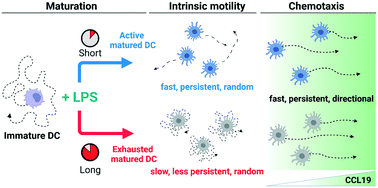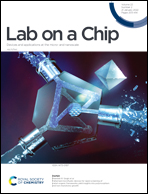Exhausted mature dendritic cells exhibit a slower and less persistent random motility but retain chemotaxis against CCL19†
Abstract
Dendritic cells (DCs), which are immune sentinels in the peripheral tissues, play a number of roles, including patrolling for pathogens, internalising antigens, transporting antigens to the lymph nodes (LNs), interacting with T cells, and secreting cytokines. The well-coordinated migration of DCs under various immunological or inflammatory conditions is therefore essential to ensure an effective immune response. Upon maturation, DCs migrate faster and more persistently than immature DCs (iDCs), which is believed to facilitate CCR7-dependent chemotaxis. It has been reported that lipopolysaccharide-activated DCs produce IL-12 only transiently, and become resistant to further stimulation through exhaustion. However, little is known about the influence of DC exhaustion on cellular motility. Here, we studied the cellular migration of exhausted DCs in tissue-mimicked confined environments. We found that the speed of exhausted matured DCs (xmDCs) decreased significantly compared to active matured DCs (amDCs) and iDCs. In contrast, the speed fluctuation increased compared to that of amDCs and was similar to that of iDCs. In addition, the diffusivity of the xmDCs was significantly lower than that of the amDCs, which implies that DC exhaustion reduces the space exploration ability. Interestingly, CCR7-dependent chemotaxis against CCL19 in xmDCs was not considerably different from that observed in amDCs. Taken together, we report a unique intrinsic cell migration behaviour of xmDCs, which exhibit a slower, less persistent, and less diffusive random motility, which results in the DCs remaining at the site of infection, although a well-preserved CCR7-dependent chemotactic motility is maintained.



 Please wait while we load your content...
Please wait while we load your content...